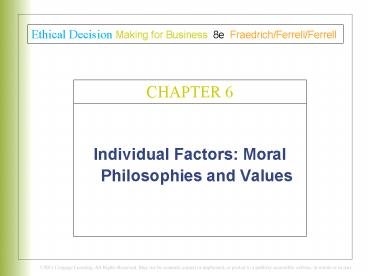Individual Factors: Moral Philosophies and Values - PowerPoint PPT Presentation
Title:
Individual Factors: Moral Philosophies and Values
Description:
Ethical Decision Making for Business 8e Fraedrich/Ferrell/Ferrell CHAPTER 6 Individual Factors: Moral Philosophies and Values Chapter Objectives To understand how ... – PowerPoint PPT presentation
Number of Views:1478
Avg rating:3.0/5.0
Title: Individual Factors: Moral Philosophies and Values
1
Ethical Decision Making for Business 8e
Fraedrich/Ferrell/Ferrell
CHAPTER 6
- Individual Factors Moral Philosophies and Values
2
Chapter Objectives
- To understand how moral philosophies and values
influence individual and group ethical decision
making in business - To compare and contrast the teleological,
deontological, virtue, and justice perspectives
of moral philosophy - To discuss the impact of philosophies on business
ethics
3
Chapter Objectives (cont.)
- To recognize the stages of cognitive moral
development and its shortcomings - To introduce white-collar crime as it relates to
moral philosophies, values, and corporate culture
4
Chapter Outline
- Moral Philosophy Defined
- Moral Philosophies
- Applying Moral Philosophy to Ethical Decision
Making - Cognitive Moral Development
- White-Collar Crime
- The Role of Individual Factors in Business Ethics
5
Moral Philosophy
- Principles or rules that people use to decide
what is right or wrong - No single moral philosophy is accepted by
everyone - Moral Philosophy Defined
- Economic value orientation
- Idealism
- Realism
6
Moral Philosophy Perspectives
- Teleology
- Deontology
- The Relativist Perspective
- Virtue Ethics
- Justice Perspectives
7
Goodness Theories
- Basic concepts
- Monists
- Pluralists
- Instrumentalists
8
Moral Philosophy and Ethical Decision Making
- Individuals use different moral philosophies
depending on whether they are making a personal
or making a work-related decision
9
Kohlbergs Model of Cognitive Moral Development
- Consists of six stages
- Punishment and obedience
- Individual instrumental purpose and exchange
- Mutual interpersonal expectations, relationships,
and conformity - Social system and conscience maintenance
- Prior rights, social contract or utility
- Universal ethical principles
10
White Collar Crime
- Crimes of the suite do more damage in monetary
and emotional loss in one year than the crimes
of the street over several years combined - The presence of technology has aided WCC
11
Individual Factors
- Most business managers do not embrace extreme
philosophies - A personal moral compass is not sufficient to
prevent ethical misconduct in an organizational
context - The corporate culture and the rewards for meeting
performance goals are the most important drivers
of ethical decision making - Equipping employees with skills that allow them
to understand/resolve ethical dilemmas will help
them make the right decisions































